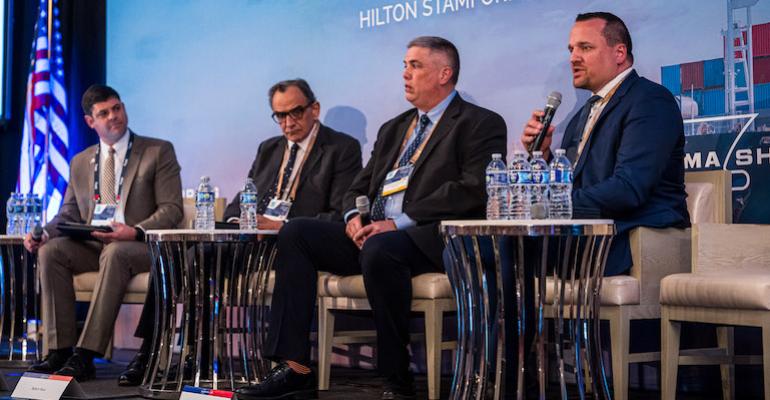The CMA Shipping 2024 panel on the future of maritime shipping discussed the pressures facing shipping, how they might shape the industry, and the form any changes might take. One theme was the scope for replacing suppliers and rebuilding supply chains to source products from closer to home.
The Covid pandemic highlighted the fragility of a supply chain centred on one country for production and export.
Robert Shaw, Past President, Society of Maritime Arbitrators, said it was worth remembering that for many of the major bulk trades there simply was no nearshoring alternative. Bulk commodities are available close to where they are produced or extracted, and needed where they are in short supply. While the dry bulk sector is in for change in the coming years, nearshoring will not be the catalyst, but changes like e-bills of lading, said Shaw.
Nearshoring potential is seen in the trades of higher end goods and assembled products, said Shaw, but there are limitations to the scale and flexibility of global manufacturing capacity to enable these trades.
Patrick PJ McGrath, Vice President Sales, Northeast, Hapag-Lloyd, said that any move away from Chinese manufacturing in the future would necessarily lead to further diversification of supply chains. While nations like Vietnam, Cambodia, and Thailand have their offerings and advantages, they also have their own logistical challenges and lack the monolithic scale and developmental focus seen in China.
In the absence of a one-stop-shop alternative to China, those looking to reduce their dependence on Chinese products for whatever reason will need to diversify their sourcing to their maintain supply chains.
Long term supply chain development may include a move to lower cost locations, and so investments have to be made to lay a foundation for the future. “But again, that is going to look different than we think it's going to look today. Africa is not China. Africa is 100 countries with all slightly different rules and regulations and simulations. So, it's not always as easy as maybe it was 2001 [when China joined WTO], it just adds a level of complexity to it,” said McGrath.
Jason Zuidema - Executive Director, North American Maritime Ministry Association, expressed his concern over trading change lanes and the lack of infrastructure to support seafarers in emerging markets. Despite a presence in over 700 ports across NAMMA and related charities, “there are lots of countries in which we don't really have port-based seafarer welfare groups, or where it’s difficult even if we have an advocacy case in a few countries.”
Often there is a lack of capacity to take seafarers ashore, leaving crews onboard. The dangers of a lack of seafarer support are increased risk to mental health from spending the vast majority of their contract onboard the ship, and the inability to address work-life balance.
As seafarer abandonments rise and shore leave remains curtailed in some companies, the challenges remain clear, said Zuidema. One encouraging factor has been the seat at the table seafarer welfare organisation have had since the pandemic, said Zuidema,
When the panel considered the impact of inflation on shipping, the impact was seen more on the demand side of the equation than in the rising costs of ship operation. The main inflationary cost for shipowners is bunkers, which can be hedged or covered in charter clauses. What is not so easily hedged is the impact on consumer demand of inflationary impacts on household budgets, leading to lower spending and less shipping demand, said McGrath.
Copyright © 2024. All rights reserved. Seatrade, a trading name of Informa Markets (UK) Limited.
Add Seatrade Maritime News to your Google News feed.  |

